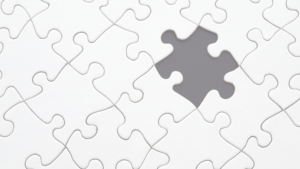
Flak jackets are designed to protect the body from harm, such as from projectiles or shrapnel. They are meant to reduce vulnerability.
Working for the Marine Corps, the term “flak jacket” represented a form of protection when under fire. Often, my Marine peers would joke about needing their flak jacket in certain situations, because (verbal) fire was being directed their way.
As a civilian, flak jackets were not standard issue. I had no physical threats nearby, so a literal flak jacket was unnecessary. However, the environment was such that a mental flak jacket was critical to my success.
Realizing the power of the personal
Fast forward many years to the leader that finally figured out my flak jacket was preventing my teams from getting to know me. From seeing me as human.
A mentor of mine put it best. No matter how put together any of us may seem, we are one loose thread away from unravelling.
So why hide it?
I remember one conversation in particular. A woman who worked for me was struggling financially and it was obviously affecting her. Since I believe in managing the whole person, I pulled her into my office and we sat down to talk through what was going on.
At one point, she said “Not that you’d ever have this problem…”
I stopped her right there. I told her a shameful truth. Something that I had not told anyone (except the financial anal retentive I married).
The shameful (yet hilarious) truth
I cannot balance a checkbook.
It’s true. I can manage hundreds of millions of dollars. However, I cannot manage a household budget.
It’s probably not for lack of ability, but I once racked up tens of thousands of dollars in debt and poor credit just from a lack of attention to paying bills on time. And guess what? My inability to balance a checkbook does not diminish my ability to manage a large organization.
We all have different talents. What our challenges provide is a way to connect with others who go through a similar struggle. If we’ve gotten to the other side, we may have advice on how they can get through as well.
Get off the pedestal!
I could have gone on letting her think I had my stuff together, but if they do not diminish my gifts, why not share my challenges?
By sharing my experience, I became human. Until then, this woman I had known for years had me on a pedestal with me screaming “take me down from here!”
In that moment, she realized that I’m just like her – and if I could find a way forward, so could she.
I was not yet done with my vulnerability journey, but it was a good start. From that point forward, I made a point of making myself more vulnerable to those I managed.
Coming unravelled
That “loose thread” mentor and I had lunch several months ago. She was worried. Worried because she heard I left my purse on the train the week before.
In itself, forgetting my purse should not have been cause for alarm. Except I don’t do things like that. Forgetfulness, for me, is a sign that I have too many things going on in my head.
She worried because she knows me well enough to see the signs. She knows I will go, go, go until I realize I’m about to hit the wall. Possibly once I hit it head on.
That’s why she wanted lunch – to see if I needed help. She knew I was unlikely to let my leadership see I was at risk or ask for a helping hand.
The big question
I had a revelation following that lunch. It was a simple question she threw out there, and it turned my ideas on vulnerability upside down.
“Do you ever think you’ll feel comfortable being as vulnerable with your manager as you are with me or your team?”
I stewed on that question for weeks.
My first thoughts were all denial. “It has not always been safe.” “Then it might diminish his confidence in my ability.” “He needs to trust that I have things under control.”
I challenged every thought I had. I forced myself to look at them closely.
Ultimately, it came down to fear. I felt safe sharing with my team and my peers. I was afraid to show weakness up because I had been taught it was the kiss of death with the Marine Corps.
However, I forgot the simple truth that he – and everyone else – knows. I’m not perfect. No one is.
The performance dichotomy
Everyone has a soft underbelly. We can spend a lot of time and energy developing armor to hide it, but it’s still there. The amusing paradox is – the more time we spend hiding it, the more people will spend trying to find it.
What I finally realized is – if I let my leadership see that I recognize my flaws and imperfections, they are more trusting.
Like my teams, my leaders know I’m not perfect. Rather than thinking I am failing or don’t know what I’m doing, asking for help develops leaders’ confidence that I will engage them when I need it.
By keeping up my armor – my “get ‘er done in the face of any obstacle” attitude – it made my managers more worried that I would fall down or wouldn’t engage them when I should. They looked for chinks in the armor and it eroded trust.
Ironically, vulnerability with leadership increases trust in our abilities instead of diminishing it.
Is vulnerability – or being human – part of how you live leadership? Have you found a difference in how you show vulnerability with your team, peers and leaders? I would love if you could share your journey in the comments and keep the conversation going.









One Response